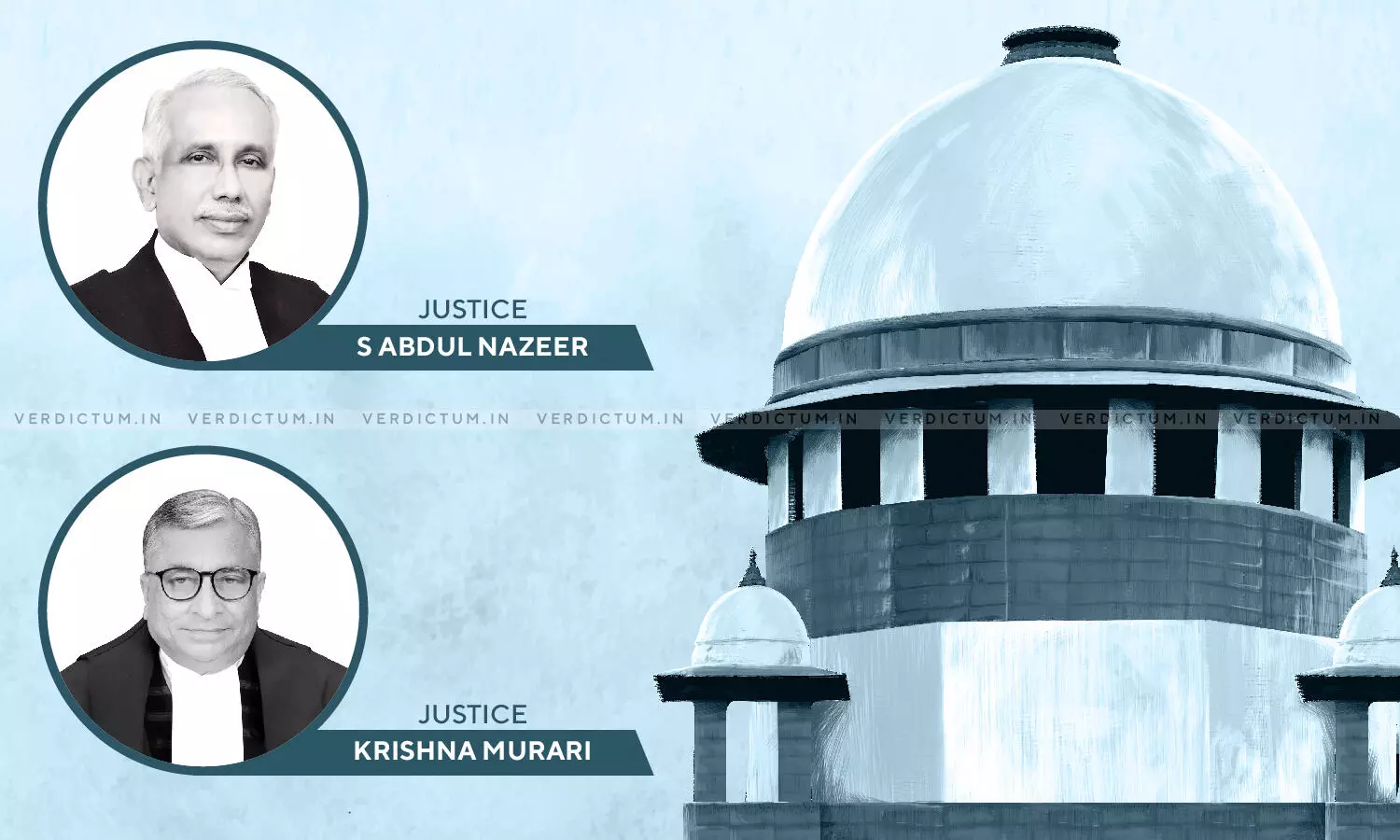
Consider Constituting 'Motor Vehicle Appellate Tribunals' For Speedy Disposal Of Appeals Under Motor Vehicles Act: SC To Law Ministry
 |
|A two-judge Bench of Justice S. Abdul Nazeer and Justice Krishna Murari while commenting upon the large number of appeals pending before the High Court filed under the Motor Vehicles Act for the purpose of compensation has directed for the establishment of Motor Vehicles Appellate Tribunals for disposal of cases related to payment of compensation to the victims of road accidents.
The Court held, "It would be just and proper to consider constituting 'Motor Vehicle Appellate Tribunals' by amending Section 173 of the Motor Vehicles Act so that the appeals challenging the award of a Tribunal could be filed before the Appellate Tribunal so constituted."
Advocate Mr. Nitin Kumar Thakur appeared for the Appellants before the Court.
An appeal was preferred by Appellants-Claimants assailing the judgment of Orissa High Court which had reduced the compensation payable to Claimants from Rs.22,60,000/- to Rs.17,00,000/-.
In this case, the Motor Accident Claims Tribunal had held that the cause of the accident of Appellant's husband was the rash and negligent driving of the offending truck by its driver. The Tribunal had awarded the compensation of Rs.12,90,064/- along with interest at the rate of 6% per annum.
This was challenged before the High Court by both the Appellants-Claimants as well as the Insurer. The High Court had remitted the matter back to the Tribunal for fresh disposal of the case. The Tribunal had increased the amount of compensation, which was challenged by the Insurer before the High Court. The Court had awarded total compensation of Rs. 17,00,000/- with interest at the rate of 7.5%.
The issue which was dealt with by the Court was whether the compensation awarded by the High Court was adequate.
The Apex Court was in agreement with the finding of the Tribunal that the income of the deceased was Rs. 15,000 per month.
Further, the Court observed, "Section 173 of the Motor Vehicles Act, 1988 provides for filing of an appeal against the award passed by the Claims Tribunal. It is settled law that an appeal is continuation of the proceedings of the original Court/Tribunal. An appeal is a valuable right of the appellant and at the stage of an appeal, all questions of fact and law decided by the Tribunal are open for the reconsideration. Therefore, the appellate court is required to address all the questions before it and decide the case by giving reasons."
"The monthly income of the deceased, as assessed by the Tribunal at the rate of Rs.15,000/- per month, is just and proper. It is also established that the deceased was 33 years at the time of his death. Therefore, application of multiplier of '16' by the Tribunal is also proper. The annual salary of the deceased comes to Rs.1,80,000/- which has to be multiplied by '16' which becomes Rs.28,80,000/-," the Bench opined.
The Court further directed the Insurer to pay to the Appellants, a sum of Rs. Rs.14,01,000/- as a balance amount along with an interest at the rate of 7.5% p.a. within a period of eight weeks.
The Bench was also added, that a large number of claim petitions under the Motor Vehicles Act are being filed before the various Claims Tribunal established throughout the country.
"Against the awards of the Tribunals, appeals are filed under Section 173 of the Motor Vehicles Act, 1988 before the relevant High Court, either by the claimants or by the insurers and owners of the offending vehicles. Large number of such appeals are pending before the various High Courts," the Court held.
Further, the Bench observed, "In order to curtail the pendency before the High Courts and for speedy disposal of the appeals concerning payment of compensation to the victims of road accident, it would be just and proper to consider constituting 'Motor Vehicle Appellate Tribunals."
The Court also made the following observations –
i) Various Benches of such Appellate Tribunals could consist of two Senior District Judges;
ii) To ensure access to justice and to avoid pendency, set up Benches of the Appellate Tribunal in various regional cities;
iii) Appropriate rules governing the procedure of the Appellate Tribunals may be framed;
iv) No further appeal against the order of the Appellate Tribunal need be provided;
v) If any person is aggrieved by the order of the Appellate Tribunal, he can invoke the Writ jurisdiction of the concerned High Court for reliefs.
The Court further directed the Ministry of Law and Justice to examine this matter.
In the light of these observations, the Court disposed of the appeal.
Click here to read/download the Judgment